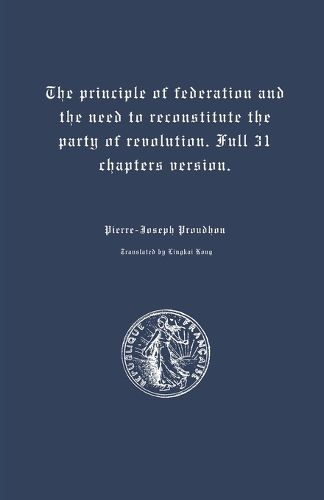Readings Newsletter
Become a Readings Member to make your shopping experience even easier.
Sign in or sign up for free!
You’re not far away from qualifying for FREE standard shipping within Australia
You’ve qualified for FREE standard shipping within Australia
The cart is loading…






Pierre-Joseph Proudhon's The Principle of Federation and the Need to Reconstitute the Party of Revolution (1863) remains one of the most underappreciated works in the history of federal political thought. Though Proudhon is often remembered as a foundational figure in anarchist theory, this particular text- written near the end of his life- has not received the attention it deserves. My hope in translating this work is to make its provocative arguments accessible to a broader English-speaking audience and to spark renewed discussion on federalism. In fact, an English version of this work already exists- the 1979 translation by distinguished scholar Richard Vernon. However, that edition only covers 12 of the original French version's 31 chapters. Richard Vernon selectively translated what he considered to be the most crucial content of the book. On the other hand, I believe there is value in producing a complete English translation of the entire work. This would not only allow for a more accurate understanding of Proudhon's original meaning, but also help maintain the text's integrity and coherence. Therefore, the contribution of this translation lies in being the first to render all 31 chapters of the complete work into English.
Proudhon wrote The Principle of Federation in the aftermath of the failed revolutions of 1848 and amid the rise of centralized nation-states under figures like Napoleon III. Disillusioned with both authoritarian state socialism and liberal capitalism, he sought a third way: a political system based on voluntary association, mutualism, and decentralized governance. At its heart, the book is a critique of Jacobin centralization and an argument for federalism as the true form of revolutionary politics. Proudhon envisions a society where power flows from local communes upward, rather than being imposed from a distant capital.
Crucially, Proudhon also calls for the "reconstitution of the revolutionary party"- not as a vanguardist elite, but as a decentralized movement committed to dismantling state authority while preventing new forms of domination. His ideas anticipate later debates in libertarian socialism, syndicalism, and even contemporary movements for municipalism and participatory democracy.
In an era of resurgent nationalism, bureaucratic centralization, and disillusionment with traditional leftist strategies, Proudhon's federalist alternative demands reconsideration. His critique of top-down revolution and his insistence on local autonomy resonate with contemporary movements seeking radical democracy beyond the state. This book is not just a historical artifact but a living challenge- to rethink how freedom and order can coexist, how revolution can avoid becoming its own tyranny, and how a truly emancipatory politics might be structured. I hope this translation contributes to that conversation.
$9.00 standard shipping within Australia
FREE standard shipping within Australia for orders over $100.00
Express & International shipping calculated at checkout
Stock availability can be subject to change without notice. We recommend calling the shop or contacting our online team to check availability of low stock items. Please see our Shopping Online page for more details.
Pierre-Joseph Proudhon's The Principle of Federation and the Need to Reconstitute the Party of Revolution (1863) remains one of the most underappreciated works in the history of federal political thought. Though Proudhon is often remembered as a foundational figure in anarchist theory, this particular text- written near the end of his life- has not received the attention it deserves. My hope in translating this work is to make its provocative arguments accessible to a broader English-speaking audience and to spark renewed discussion on federalism. In fact, an English version of this work already exists- the 1979 translation by distinguished scholar Richard Vernon. However, that edition only covers 12 of the original French version's 31 chapters. Richard Vernon selectively translated what he considered to be the most crucial content of the book. On the other hand, I believe there is value in producing a complete English translation of the entire work. This would not only allow for a more accurate understanding of Proudhon's original meaning, but also help maintain the text's integrity and coherence. Therefore, the contribution of this translation lies in being the first to render all 31 chapters of the complete work into English.
Proudhon wrote The Principle of Federation in the aftermath of the failed revolutions of 1848 and amid the rise of centralized nation-states under figures like Napoleon III. Disillusioned with both authoritarian state socialism and liberal capitalism, he sought a third way: a political system based on voluntary association, mutualism, and decentralized governance. At its heart, the book is a critique of Jacobin centralization and an argument for federalism as the true form of revolutionary politics. Proudhon envisions a society where power flows from local communes upward, rather than being imposed from a distant capital.
Crucially, Proudhon also calls for the "reconstitution of the revolutionary party"- not as a vanguardist elite, but as a decentralized movement committed to dismantling state authority while preventing new forms of domination. His ideas anticipate later debates in libertarian socialism, syndicalism, and even contemporary movements for municipalism and participatory democracy.
In an era of resurgent nationalism, bureaucratic centralization, and disillusionment with traditional leftist strategies, Proudhon's federalist alternative demands reconsideration. His critique of top-down revolution and his insistence on local autonomy resonate with contemporary movements seeking radical democracy beyond the state. This book is not just a historical artifact but a living challenge- to rethink how freedom and order can coexist, how revolution can avoid becoming its own tyranny, and how a truly emancipatory politics might be structured. I hope this translation contributes to that conversation.